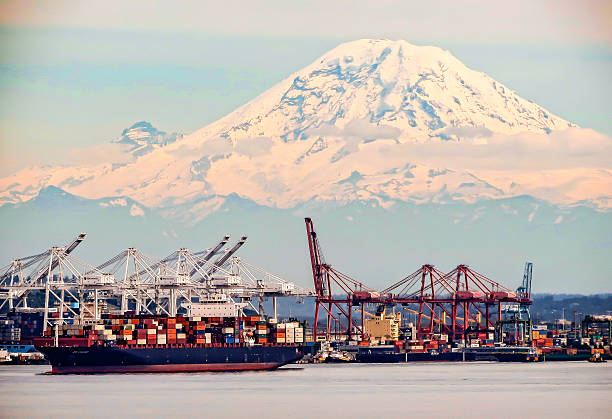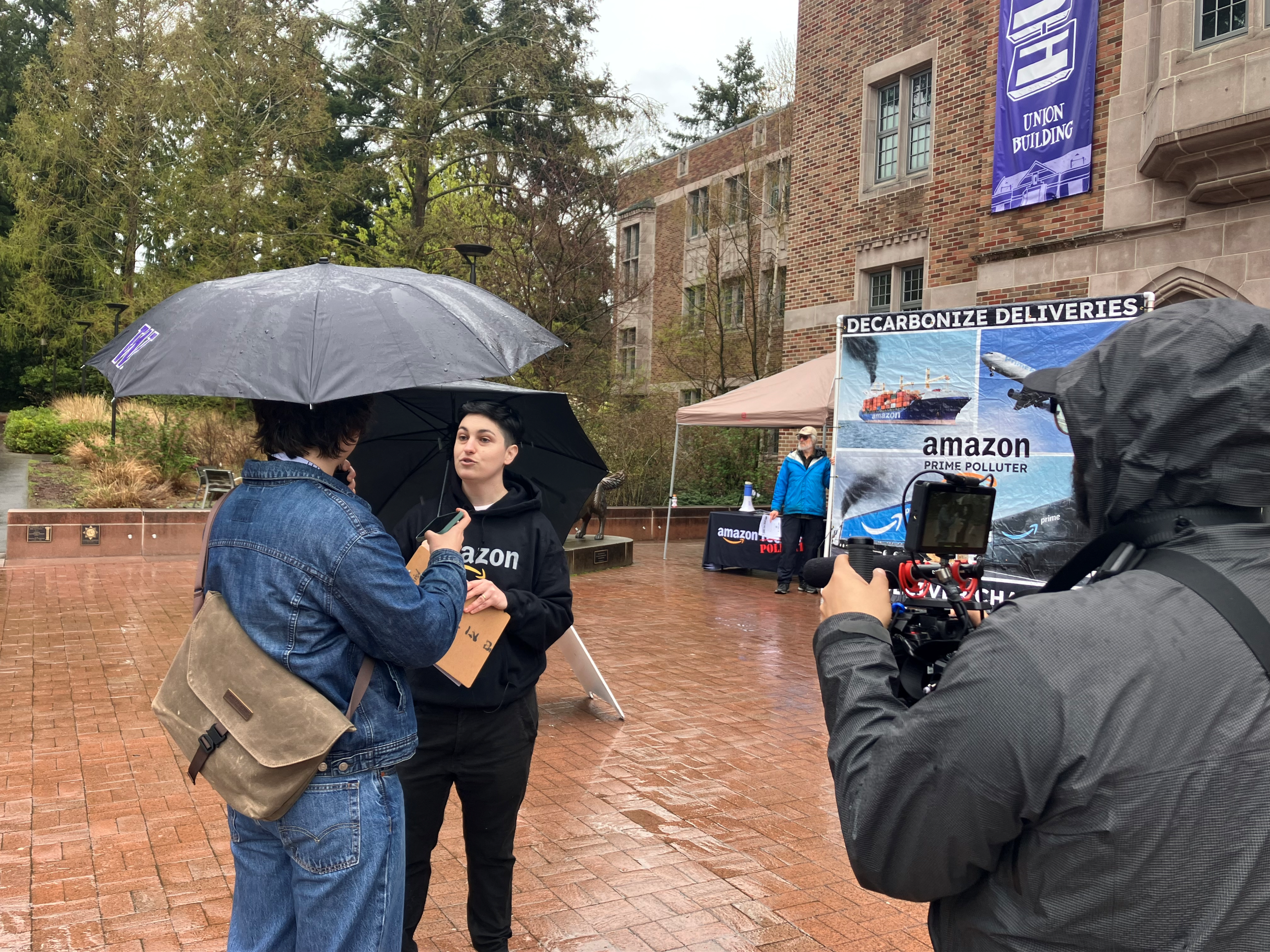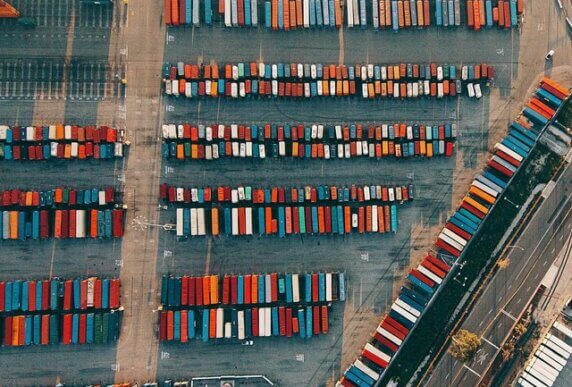


SEATTLE, WA — Ahead of U.S. President Joe Biden’s visit to Portland and Seattle later this week, climate advocates with the Ship It Zero coalition are calling for the federal government to help address the ocean shipping industry’s growing pollution problem. Ship It Zero is asking that the administration use funding from the $1 trillion infrastructure package to create a green shipping corridor between Seattle and Busan, South Korea.
Due to COVID-19 pandemic-related congestion issues at California ports, imports through the ports of Seattle and Tacoma are up 40% over 2019 — alongside growing pollution concerns for nearby communities. A green shipping corridor announcement during Biden’s visit to Seattle would be extremely timely, given the similar announcement made earlier this year by the ports of Los Angeles and Shanghai.
As a signatory of the Clydebank Declaration launched at COP 26, the U.S. is already committed to collaborative efforts to establish green shipping corridors among some of the world’s busiest maritime shipping routes. Just last week, the U.S. Department of State highlighted efforts underway by the Biden Administration to support a zero-emissions, short-sea shipping corridor between Seattle and Juneau, Alaska.
MEDIA AVAILABILITY
Experts from the Ship It Zero coalition, led by environmental advocacy groups Stand.earth and Pacific Environment, are available to comment on Biden’s visit and any announcements related to zero-emissions shipping initiatives and/or port infrastructure upgrades that he may address. In addition, one spokesperson will be in Seattle on Friday and available for interviews. Spokespeople include:
- Madeline Rose, Climate Campaign Director at Pacific Environment. See bio.
- IN SEATTLE ON FRIDAY: Kendra Ulrich, Shipping Campaigns Director at Stand.earth. See bio.
The Ship it Zero coalition draws attention to the role that major retail companies like Amazon, Walmart, Target, and IKEA play in climate change and port pollution in the U.S. Research shows these retail giants are some of the top importers into the U.S., and their cozy relationships with fossil-fueled cargo carriers are saddling people living near major U.S. ports like Seattle and Los Angeles with increasing amounts of climate, air, and ocean pollution.
PORT INFRASTRUCTURE
During his stops in Portland and Seattle, Biden is expected to address his $1 trillion infrastructure package passed in November 2021, which included $17 billion to improve ports and waterways, and showcase how the administration is “using Mother Nature to help tackle climate change and support the economy,” including efforts to expand solar energy, offshore wind farms, and other clean energy initiatives in the infrastructure package. Also this week, the U.S. Department of Transportation is expected to make an announcement on how the infrastructure law will help states reduce emissions across transportation sectors.
Any announcement of a green shipping corridor between Seattle and Busan would bolster Biden’s commitment to clean up the emissions from the heavily polluting ocean shipping industry. Late last year at COP 26 in Glasgow, the White House launched the First Movers Coalition, a public-private partnership with the World Economic Forum and retailers like Amazon to commercialize emerging technologies essential to decarbonizing heavy industries, including ocean shipping.
The market for transoceanic cargo shipping has grown over the past several decades, and the pandemic accelerated the trend toward shipping goods bought online. More than 50,000 merchant ships carry around 80 percent of global trade, and ocean-going cargo volumes are projected to grow by as much as 130 percent by 2050. Every single merchant ship in operation right now runs on fossil fuels, with most of them running off of one of the dirtiest fossil fuels on the planet, heavy fuel oil.
WEST COAST PORT POLLUTION
The Los Angeles area receives 40% of all containerized cargo imports to the U.S., which come through the ports of Los Angeles and Long Beach, making nearby communities particularly vulnerable to harmful pollutants. Port-adjacent communities experience up to eight years lower life expectancy than the Los Angeles County average, and have the highest risk of cancer regionally.
During the pandemic, port pollution has skyrocketed. According to the California Air Resources Board, in 2021, fossil-fueled cargo ship congestion at the ports of Los Angeles and Long Beach caused an increase in nitrogen oxide (NOx) emissions equivalent to adding 5.8 million passenger cars to the region, and an increase in particulate matter (PM) emissions equivalent to 100,000 big rig trucks per day. Both pollutants are associated with higher risk of asthma, cancer, and premature death.
Other West Coast ports also bear a heavy pollution burden from international shipping. According to a 2019 study by the International Council on Clean Transportation, the ports of Seattle/Tacoma and San Francisco have the highest rates in the U.S. of early deaths per 100,000 residents from port pollution, more than double the global average. A 2013 study by Just Health Action and Duwamish River Cleanup Coalition found that life expectancy in Seattle’s port-adjacent neighborhoods of Georgetown and South Park is up to 13 years shorter than wealthier and less diverse parts of the city.
On Earth Day, activists in Bellingham, Washington, and Long Beach, California, will protest major retailer Target’s role in climate change with “die ins” at local stores, after Ship It Zero research revealed that 95% of Target’s imports pass through West Coast ports. Activists in Seattle will greet Biden’s motorcade with signs of Biden wearing a “Ship It Zero” pilot’s hat and citing his statement that “climate change is the existential threat to humanity.” (Photos will be available here.) Also on Earth Day, the Long Beach City Council plans to introduce a resolution in committee calling on major retail companies to adopt zero-emissions shipping by 2030, following in the footsteps of a similar move by the Los Angeles City Council last year.
ZERO-EMISSIONS SHIPPING SOLUTIONS
The science shows that zero-emissions solutions are within grasp. According to a 2020 International Council on Clean Transportation study, Transpacific voyages could be powered by green hydrogen instead of fossil fuels, with only minor changes to ship fuel capacity or operations.
In October 2021, Amazon and IKEA helped launch coZEV, a retailer-led initiative to move away from fossil-fueled maritime cargo ships by 2040. The initiative will define zero-carbon fuels based on an analysis of lifecycle greenhouse gas emissions, ensuring that neither blue hydrogen (natural gas-derived hydrogen) nor liquefied natural gas will be considered.
In November 2021, the Port of Seattle and Seattle City Light received funding from the U.S. Department of Energy to study the potential for the large-scale storage and use of green hydrogen to power ships docked at port while being loaded and unloaded, as well as heavy equipment like forklifts and cranes, and help inform what it would take to use clean hydrogen as a fuel source for larger ships.
Earlier this year, shipping giant Maersk announced plans to install hundreds of offshore electric-powered charging stations at ports to reduce emissions from the ships in its fleet. The carrier will also introduce 8 cargo ships that run on “carbon neutral” methanol to its fleet by 2024, although Ship It Zero has some concerns over the reliance on carbon capture.
###
Media contacts:
In Seattle: Virginia Cleaveland, U.S. Media Director, Stand.earth, +1 510 858 9902, virginia@stand.earth (PT)
Gwen Dobbs, Pacific Environment, gdobbs@pacificenvironment.org, 202-329-9295 (ET)

Recent Updates





